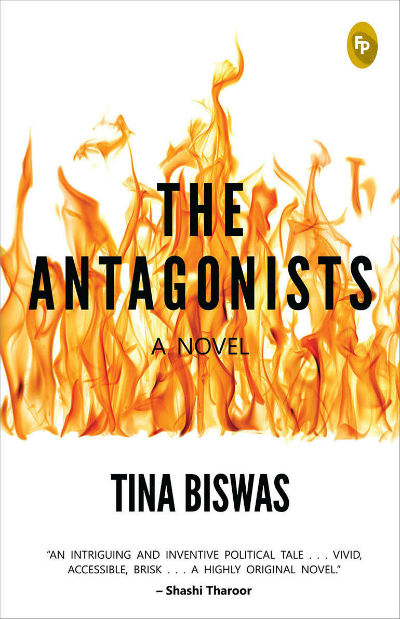Does literature inspire life or does life inspire literature? The question is akin to a chicken and egg situation. The simple answer I think is that life and literature are reflections of each other, one without other is not worthwhile.
Although majority of contemporary fiction is market based and targeted to specific section of readers – for example, romantic fiction, crime thriller, horror, paranormal, comedy, sci-fi, adventure and combinations thereof, a small segment actually qualifies as “contemporary”, as in it captures the world we live in, and tells story of its inhabitants going through current affairs.
Such books are valuable from the point of view that they will tell the stories of our time – both its good and bad points included – to future generations. They capture our socio-political evolution, our struggles, our tendency to go through the same cycle of circumstances again and again as a race and never really changing when it comes to fundamentals.
| Book Title | : | The Antagonists |
| Author | : | Tina Biswas |
| Publisher | : | Fingerprint! Publishing (1 January 2019) |
| # of Pages | : |
424 1286 KB, 424 (Kindle EBook) |
| Purchase Link(s) | : |
Team Thinkerviews has an affinity for such books and hence when we came across Tina Biswas‘ third book The Antagonists, I got the chance to read it and share my views on it. Like her previous novel The Red Road, “The Antagonists” is set in India and was released by Fingerprint! Publishing in January, 2019.
We thank Fingerprint! Publishing for providing a copy of this book for our unbiased review.
The coverpage is the doorway to the world captured in the book and more often than not the first reason for the book browsers to pick up any book from the shelf. So, as usual let’s take a look:

The Antagonists by Tina Biswas | Book Cover
An elegant, minimalistic cover page showing a white background with flames leaping through it, conveys the message of an explosive, controversial story inside. The quote on the front cover by Shashi Tharoor will ping the radar of astute browsers to confirm that the book features prominent politicians and events created by them and surrounding them.
The blurb on the back cover page is succinct enough to give you only main pointers of the story and leaves enough out that as a reader you are intrigued to know, what is inside.
Starting with an explosive statement: “Terrorists are terrorists and Murderers are Murderers“, the book draws you straight into modern-day Kolkata, where a posh hospital has sustained fire and 112 patients have died in it. These are the words of Paramita Guha Roy, aka Devi, who has recently become the chief minister of West Bengal in a historical victory that saw the end of decades long communist party governance. You will easily recognise the white sari clad leader with her humble background, mercurial moods and explosive temper with her real-life version.
The hospital belonged to Sachin Lohia, an entrepreneur who is part of Marwari community. Now, West Bengal has a history of differences between the entrepreneurial, money-handling classes and the self-acknowledged intellectuals. From this deep-rooted prejudice, Devi starts a campaign against Sachin Lohia, holding him personally responsible for the fire. Lohia goes to jail, but the investigation clears him of the charges. This, however, is of no value to Devi, who takes on a personal vendetta against Lohia and his companies.
On the other end is Anil Thakur, Lohia’s right-hand man and brain behind the scenes. Anil has a business degree from Harvard and is an intelligent man who is keen to get into the real world and do something concrete. This is why he returned to Kolkata after his studies rather than taking a lucrative job abroad. He decides to counteract Devi’s moves by playing a longer game through expanding the Lohia Group’s business to coal mining. To this end, he manages to acquire a coal mining block in a place called Balachuria.
Outside all this is Dr. Anima Acharya, a world-class neurosurgeon who returned to Kolkata after living in UK for many years. Her current practice is restricted to attending wealthy patients with lifestyle diseases. So when the Lohia group offers her a job in the new hospital being built at the site of the fire, she is looking forward to it. But on the personal front, her marriage unravels as she thinks her husband is having an affair. Instead of confronting him, Anima seeks refuge in her childhood home in Balachuria. The house has been out of use for a long time and she finds it in a derelict state. It has been looked after by a local girl called Tipu and her family.
As Anil and the Lohia group try to secure the locals in favour of the proposed coal mine, Devi tries to stop the mine through delaying various licenses required from the state government and its bureaucrats. Things get more complicated when everyone discovers that most of the land for the mine belongs to Anima and not the locals.
Considering the job offer from Lohia group, and the family acquaintance between Anima and Anil, the whole thing looks like a conspiracy and Devi takes the issue to streets. And in spite of Anil’s good intentions, he finds that he’ll need to make a deal with the devil. Soon, all the characters are caught in the web of lies and violence.
But, on this chessboard of war, it is only the pawns who lose their lives while the antagonists learn to survive at any cost…
As you may have guessed the story is set around the fire at AMRI in Kolkata in 2011, and Trinamul Congress’ historical rise to power under the leadership of Mamta Banerjee. And although the book very accurately captures the West Bengal aversion to entrepreneurial wealth and leftist tendencies of its people, politicians are same all around the world, when it comes to opportunism and lack of principles. The events described in the book could have happened anywhere, albeit with different motives and slightly different outcomes based on the socio-economic condition of wherever it was set up.
With her Bengali heritage, Tina Biswas has an insight into the Bengali mind and she employs it with ruthlessness while detailing her characters. She herself classifies her writing as irreverent and it might appear so, if you haven’t read similar books before, but the satire and dry sense of humour makes the narrative appealing, rather than dark and foreboding. Life is never easy no matter where you live in the world, so it helps if we can take a joke on ourselves and on the people we admire, when it focuses on certain traits rather than character. We all possess certain weirdness, so why not look at the world and accept that every denizen has a flaw or two.
The biggest strength of the book is the writing itself – instead of relying on dialogues to keep it fast-paced, Tina Biswas gives us insights into situations and characters both, supporting it with solid dialogues when necessary. This helps the reader as the narrative moves from character to character and place to place.
The writer captures modern India’s need and desire to attract investment, jobs, and wealth through industrial expansion, while trying to ensure fair treatment of people involved and thoughtful use of natural resources. The usual practice is, of course, a hatchet job as long as the approvers receive their share of the pie, and leave the rest to the conscience of the corporations whose primary motive is the profit from the venture. The heavy deforestation started in British era and has only gotten worse since then, leaving us with countless villages where nothing happens:
By early twentieth century, the British, with their agrarian invasion and their mentality of forest only as economic resource, had already wrecked the joint. Deforestation, commoditisation, decimation – what was once moist tropical, deciduous forest had become a semi-arid land, frequently suffering from droughts, which caused crop failures, which caused nutritional failures, which caused diseases.
The kind of place where everything – ambition, desire, passion, energy – was attenuated, until just getting through another day was seen as a success.
Is it partly due to our need to look towards others for changing our circumstances, that we allow such state of affairs?
If you want to be treated as an equal, you have to be an equal. No point in continuing to play the victim, however convincing the testimony.
Why do we still expect the politicians and the government to make the right decisions for us in spite of a long history of incompetence and disappointments:
In a place where politician were still trusted to do what was best for the people, despite plenty of evidence to suggest the contrary, and where businessmen were still assumed to be liars and swindlers, despite plenty of evidence to suggest the contrary.
— — — — — —
For politicians, everything has to be outlined, abridged, summarised. If it can’t be quoted in a newspaper or used as a slogan, it’s not worth their time. If they can’t understand what is being explained, it is never their fault for not being clever enough to understand. Yet we allow such kings of casuistry, who have no intention of understanding the facts, to lead us from one delusional state to another.
The characters themselves are identifiable, real and alive. There are bound to be comparisons between some events described in the book and real life situations including the character of Devi and Mamta Banerjee. But of course, you need to remember that Devi is a work of fiction, even though she may be built on similar lines. She is a powerful character with a capacity to keep everyone around her quaking with fear. Her emotions are deep-felt and right, her flaws are that of intellect and understanding. She has plenty of shrewdness though and even though she struggles with the newfound power, she carries on the battle in face of all obstacles:
Being in power was like being plunged into a pool of cold, swirling water and barely being able to work out which way was up and which was down, let alone breathe!
Considering her biggest claim to power is that she is one of the people, and so only she can know what’s right for them, brings to mind the question that the Romans also faced when forming their democratic and judicial set-up. Who should rule? What are the qualities required in a ruler? Do they need qualifications and/or experience in administration, humanities, public relations, economics, etc. or just a plain majority is enough? Of course, in the current state, there is an army of bureaucrats designed to provide such support to the elected members, but when the head of state refuses to take their advice, how can the system work? And that is where the common man suffers. Tina Biswas does an excellent job of conveying all these through Devi and her interactions with her ministers and her personal aid Nigel.
Anil probably gets the most screen time through the book and you start sympathizing with him right from the beginning – for his young enthusiasm, if nothing else. It becomes painful later to see him falter, and see him question what he trusts:
When you become devious, you question other people’s motives, too.
— — — — — —
I have sacrificed peace of mind for winning at all costs. But it’s a one-way street. No U-turns are possible. And then he also realised that although he might have started the enterprise as a cool-headed, clear-eyed strategist, slowly but surely, he had become involved to the point of emotion. What happened now didn’t only matter, it mattered to him.
A fair amount of pithy observations about the rich and poor divide, the historical background and current affairs in West Bengal are shared through Anil’s character:
Nowadays, poor people were ostensibly enabled to achieve their own goals and exercise their agency through outside advocacy and assistance. And if that resulted in them remaining poor and uneducated and deprived, then so be it!
— — — — — —
A journey of a thousand miles begins with a single step. Well, what if the road was circular and you kept stepping only to find yourself right at the start again?
And then there is Anima and her story. From appearances, she has led a life of privilege. But from the moment her story starts, you observe how little it takes for an apparently happy and successful existence to come apart. For her, it becomes a journey of self-discovery a few times over, only to lead to loss. And the saddest part is, to a reader, it all seems preventable. Although you understand her thought processes, her reasoning and her reluctance, you still wish that she would act differently, confront the dark realities of her life face-on.
Following quotes show some of the thoughts and feelings that Anima goes through:
The undimmed righteousness of youth, the vigour, the passion, the simple belief that there was a point to it all, not yet untrammelled by the disappointments and distrust of the autumn years leading to a fog of apathy.
— — — — — —
There are only handful of people in this world that really don’t need anybody else. Everyone else, despite the frustrations and the irritations and the exasperations and the botheration, we all still cling to each other and rub along.
— — — — — —
The brain liked repetition, it liked when you were living your life on repeat. But you could kick it into gear. You could be more than an accumulation of routines and memories and patterns of behaviour!
Tina Biswas keeps us interested, as the threads involving all these people get entangled and they all find themselves on quicksand. The matter of coal mining and clean energy provides a fitting and engaging topic of debate, as everyone is bound to have some opinion on it. The writer herself doesn’t mince words anywhere, and certainly has opinions that she conveys throughout the book.
There are a few errors and printing mistakes in the book, but nothing to take away from the flow. I did feel that it gets a bit slack in last few chapters and the end leaves a few threads open for the readers to further think about.
This Is Here In For You
Summary:
All in all, it is a comprehensive tale of modern-day West Bengal and its changing political and socio-economic scenario. At 421 pages, it may take you a day or two, but it will be worth it, if you are open to reading a book set in the modern world.
Around 8 out of 10.
Quick Purchase Links:
- Buy Book From Amazon India – Paperback
- Buy Book From Amazon India – Kindle EBook
- Buy Book From Amazon US – Paperback
- Buy Book From Amazon US – Kindle Ebook
Over To You:
If you already have read the book do share your remarks and thoughts via comments below. Does this review help you in making your decision to buy or read the book? Do not forget to share this article with your friends over various social networks via Twitter, Facebook and others. And yes, you may like to subscribe to our RSS feeds and follow us on various Social networks to get latest updates for the site to land right in your mail box.
 ThinkerViews – Views And Reviews Personal views and reviews for books, magazines, tv serials, movies, websites, technical stuff and more.
ThinkerViews – Views And Reviews Personal views and reviews for books, magazines, tv serials, movies, websites, technical stuff and more.




